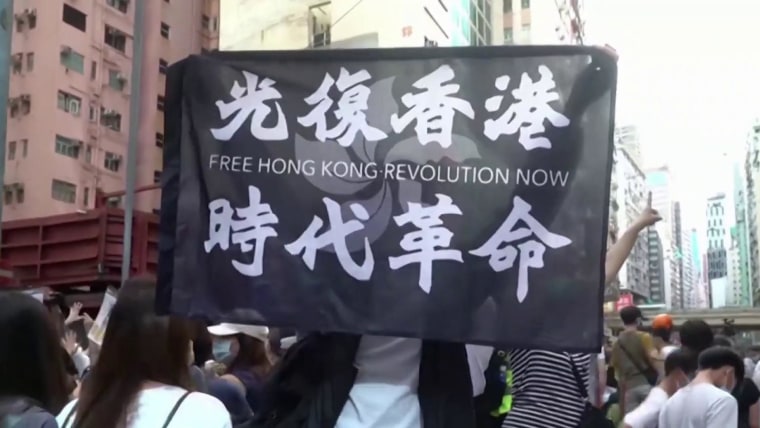TAIPEI — On the walls of the Protection Umbrella, a diner in Taipei, posters show protesters wearing gas masks and helmets battling police in Hong Kong.
The restaurant was opened in April to provide jobs for protesters who fled to Taiwan to escape arrest during the demonstrations over the past year in the former British colony.
Now that Beijing has enacted a national security law for Hong Kong, heralding significant changes in the territory’s governance, the exodus is expected to increase.
The law will allow Beijing to mete out severe punishment to anyone found guilty of secession, subversion, terrorism and collusion with external forces to threaten national security. It could see the Chinese government sending in its own law enforcers.
As of 10 p.m Thursday, Beijing time, police had arrested about 370 people, including six males and four females, on suspicion of breaching the National Security Law. Others were arrested for offences including unlawful assembly, disorderly conduct in a public place, furious driving and possession of offensive weapon.”
In the Protection Umbrella restaurant, concern over potential repression in Hong Kong runs deep.
The diners are mostly Hong Kong people who speak Cantonese instead of Mandarin. And the challenges faced by their homeland are never far from their minds.
“The Chinese Communist Party should honor the Sino-British Joint Declaration if they want to be a player in the international community,” said Winnie Ho, who moved to Taiwan in 2014 following an earlier wave of anti-government demonstrations called the Umbrella Movement, after which the restaurant is named.
Under the treaty reached between China and the United Kingdom on how Hong Kong should be governed after its handover in 1997, Beijing had promised the territory would enjoy significant autonomy — and that rights and freedoms would be protected by law.
But actions by Beijing in recent years — including prescreening of candidates for chief executive — had already caused some residents to fear that Hong Kong’s freedoms were being eroded.
“I am quite pessimistic. … If people can leave, they should,” said Betty Ng who, along with her husband, obtained Taiwan residency by investing in a B&B in eastern Taiwan’s Taitung county.
“We got used to what we had before. We had freedom of speech, we were free to criticize and comment on anything we didn’t like, but now it seems that you have to discipline yourself.”
Such fears have prompted an increasing number of Hong Kong residents to move elsewhere, and Taiwan is among the top choices.
It’s seen as a safe haven, popular also because of its proximity as well as its similar language and culture. Even though Beijing sees the island and the mainland as a part of one country to be reunified one day, Taiwan has been ruled separately for more than a century, including as a vibrant democracy in recent decades.
Last year, 5,858 Hong Kongers obtained residency permits here — an increase of 41 percent over the previous year, according to statistics from Taiwan’s Ministry of the Interior.
Some of the more active protesters will risk arrest under the new law, the Rev. Huang Chun-sheng at the Chi-lam Presbyterian Church in Taipei, said. He has helped more than 200 Hong Kong protesters settle here in recent months.
“Our friends in Hong Kong tell us the first targets for arrest include human rights workers, front-line protesters and even church officials who kindly offered the church for the protesters to rest,” he said.
“Under the security law, activities, protests, and freedom of speech will be limited,” he said “"So Hong Kong will become just like a Chinese city.”
More Hong Kongers are expected to immigrate abroad. On the first day the law came into effect Wednesday, Hong Kong’s government showed it had every intention to administer it; police made its first 10 arrests related to the forbidden violations.
Kolas Yotaka, a spokeswoman for the Taiwanese presidential office, says the government will provide “necessary assistance” to“Hong Kong and Macau residents whose safety and liberty are immediately threatened for political reasons,” citing the wording in an article of a Taiwanese law regarding this matter.
“The new office … will help more efficiently evaluate and process applications on a case by case basis,” she said. It will be called The Services and Exchanges Office.
But not everyone fears the National Security Law and wants to leave. Some like Lydia Lee are even glad to see the law imposed.
“I’m not worried. I think if we don’t stir up trouble, we will be fine,” said Lee. “During the protests, it was awful, I didn’t dare to go out. My friends couldn’t go to work because the protesters had blocked the roads. They said they were fighting for their freedom, but what about our freedom? … Now that the law has been adopted, these people won’t dare to cause chaos.”
Like many Hong Kong people prior to the territory’s handover, Lee and her husband obtained Canadian passports, but they decided to stay in Hong Kong.
“We thought it would be really bad, but we don't feel our freedoms have been suppressed after the handover,” Lee said.
Others blame the protesters for making matters worse by handing Beijing the perfect reason to impose the new law.
They believe it’s impossible to force China’s government to accept democracy overnight or even in a few decades, but that through time, peaceful appeals, the Chinese people's growing awareness of universal rights and China's political reforms, the goal can eventually be achieved.
World - Latest - Google News
July 03, 2020 at 05:33PM
https://ift.tt/3ikNOXY
As China tightens its grip on Hong Kong, people are leaving for Taiwan - NBC News
World - Latest - Google News
https://ift.tt/2SeTG7d
https://ift.tt/35oCZy1
Bagikan Berita Ini















0 Response to "As China tightens its grip on Hong Kong, people are leaving for Taiwan - NBC News"
Post a Comment